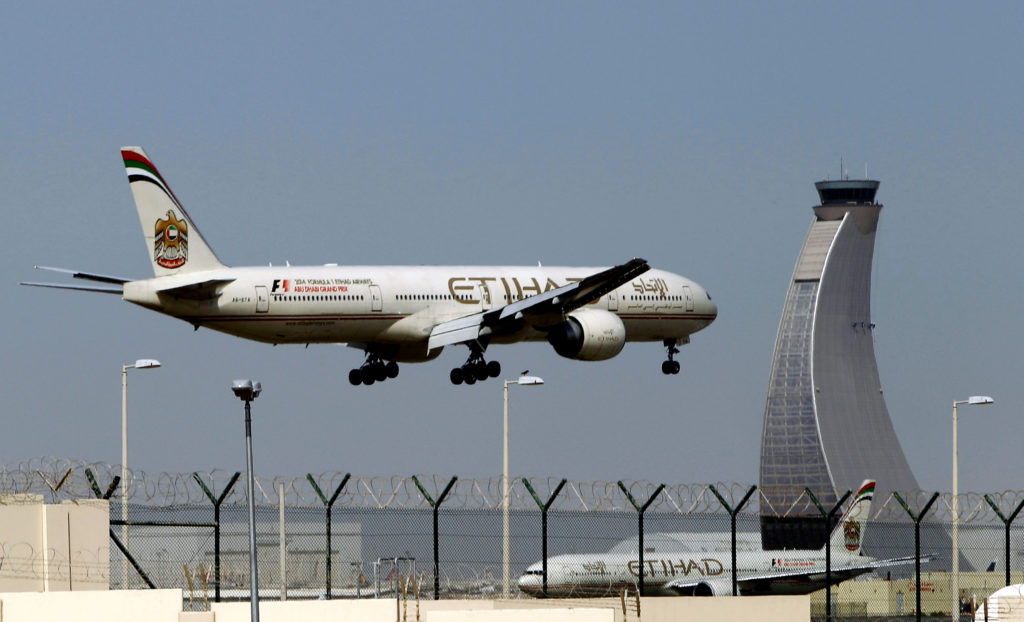The flight marks an open moment of cooperation between Israel and the United Arab Emirates after years of covert relations.
By Associated Press
On Tuesday, Etihad Airways flew the first known direct commercial flight between the United Arab Emirates (UAE) and Israel.
UAE, home to Abu Dhabi and Dubai on the Arabian Peninsula, has no formal diplomatic ties to Israel, but the two nations have enjoyed covert, back-channel relations for years.
The flight on Tuesday brought aid for the Palestinians amid the coronavirus pandemic and marks an open moment of cooperation between Israel and the UAE after years of rumored back-channel discussions between them over the threat posed by Iran.
Etihad, a state-owned, long-haul carrier, confirmed it sent a flight Tuesday to Tel Aviv’s Ben Gurion Airport.
“Etihad Airways operated a dedicated humanitarian cargo flight from Abu Dhabi to Tel Aviv on 19 May to provide medical supplies to the Palestinians,” the airline told The Associated Press.
“The flight had no passengers on board.”
In the past, private and diplomatic planes often had to travel to a third country before heading onto Israel.
Emirati government officials did not respond to multiple requests for comment.
The UAE’s state-run WAM news agency later issued a statement saying it delivered 14 tons of protective gear, medical items and ventilators “to curb the spread of COVID-19 pandemic and its impact” in Palestinian-controlled territory.”
It did not acknowledge the flight nor its significance.
The Israel Airports Authority confirmed the cargo flight landed at Ben Gurion on Tuesday night.
An Israeli official said the flight would be delivering humanitarian aid provided by the UAE to the Palestinians and that the cargo flight was coordinated with the Israeli government. The official spoke on condition of anonymity due to the sensitivity of the subject.
Neither the Gaza Strip nor Judea and Samaria have their own airports, meaning most cargo bound for Palestinian territory enters through Israel. That likely required an airlift of the material from the UAE, which hosts humanitarian stockpiles for the United Nations.
The UAE, a federation of seven sheikhdoms founded in 1971, had no significant history with Jews.
While not acknowledging Israel diplomatically, Emirati officials have allowed Israeli officials to visit and the Israeli national anthem was played after an athlete won gold in an Abu Dhabi judo tournament. Israel also has a small mission representing its interests at the International Renewable Energy Agency in Abu Dhabi.
Next year, Israel will take part in its delayed Expo 2020, the world’s fair being hosted by Dubai. A secret synagogue also draws practicing Jews in Dubai. The UAE also has announced plans to build the Abrahamic Family House in Abu Dhabi, which will house a mosque, a church and a synagogue.
The extent of Gulf Arab ties with Israel is still mostly kept private, though.
Oman, which has ties with Iran, hosted the Israeli prime minister in a surprise visit in 2018 that served to remind Washington of its unique ability to be a conduit for talks.
But such ties remain highly contentious among the Arab public.
Tensions also rose between Israel and the UAE after suspected Mossad assassins killed a top Hamas operative in a Dubai hotel room in 2010, something never acknowledged by Israel. In the time since, however, Israelis traveling with Western passports routinely enter the UAE without a problem, though one still can’t make a phone call between the two countries.


